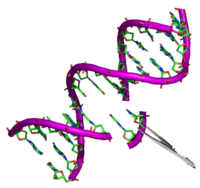
Photo from wikipedia
Selenium (Se) is a micronutrient essential for human and animal health. However, Se is toxic at high levels because the nonspecific substitution of cysteine by selenocysteine could lead to protein… Click to show full abstract
Selenium (Se) is a micronutrient essential for human and animal health. However, Se is toxic at high levels because the nonspecific substitution of cysteine by selenocysteine could lead to protein malfunction. In an attempt to prevent nonspecific selenocysteine incorporation into proteins, we simultaneously overexpressed the gene encoding selenocysteine lyase from Homo sapiens (HsSL), which specifically catalyzes the decomposition of selenocysteine into elemental Se0 and alanine, and the gene encoding selenocysteine methyltransferase from Astragalus bisulcatus (AbSMT), which methylates selenocysteine into methylselenocysteine in rice. The transgenic plants showed normal growth under standard conditions. Se treatment resulted in higher levels of alanine and methylselenocysteine in transgenic plants than in wild-type plants, which indicated that this approach might have successfully redirected Se flow in the plant. Overexpression of HsSL and AbSMT in rice also endows transgenic plants with hyposensitivity to Se stress at the seed germination stage. The transgenic plants showed enhanced selenate and selenite tolerance, which was simultaneously supported by fresh weight values. Moreover, our phytoremediation assay revealed that the transgenic plants exhibited greatly improved Se elimination capabilities and accumulated about 38.5% and 128.6% more Se than wild-type plants when treated with selenate and selenite, respectively. This study offers hope that genetically modified plants could play a role in the restoration of Se-contaminated environment.
Journal Title: Journal of plant physiology
Year Published: 2022
Link to full text (if available)
Share on Social Media: Sign Up to like & get
recommendations!